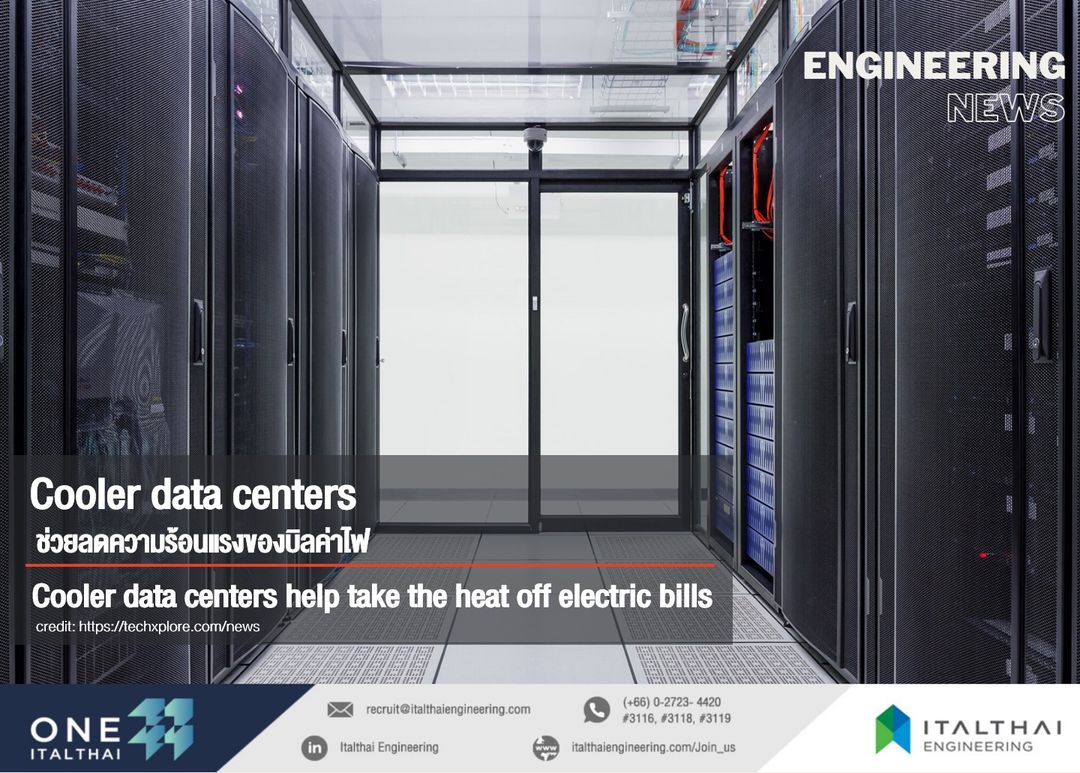ข่าวสารอื่นๆ Other News
Cooler data centers ช่วยลดความร้อนแรงของบิลค่าไฟ Cooler data centers help take the heat off electric bills
27/08/2021

บทความโดย Techxplore เมื่อวันที่ 18 สิงหาคม 2564
.
Cooler data centers
ช่วยลดความร้อนแรงของบิลค่าไฟ
.
การถ่ายทอด (Streaming) ภาพยนตร์หรือเกม, การแชร์รูปใน IG, การใช้อุปกรณ์อัจฉริยะ (smart device) ตลอดจนการเติบโตของเทคโนโลยีปัญญาประดิษฐ์ (AI) ทำให้ปริมาณการประมวลผลข้อมูลทวีความรุนแรงขึ้น คาดการณ์การใช้พลังงานของศูนย์ข้อมูลในสหภาพยุโรป (EU) จะเพิ่มขึ้นจาก 2.7% ในปี 2561 เป็น 3.2% ภายในปี 2573
.
การระบายความร้อนให้กับ Data Center เป็นสิ่งสำคัญ การสร้าง Data Center ในสภาพแวดล้อมที่อากาศหนาวเย็น เช่น Arctic Circle หรือมหาสมุทร อาจเป็นวิธีหนึ่ง แต่อย่างไรก็ตาม เทคโนโลยีประหยัดพลังงานอื่นๆ กลับต้องอยู่ในสภาพอากาศที่อบอุ่นมากกว่า
.
Xudong Zhao (ศาสตราจารย์ด้านวิศวกรรมที่ University of Hull แห่งสหราชอาณาจักร) ผู้ประสานงานโครงการ DEW-COOL-4-CDC พัฒนาระบบปรับอากาศที่ลดการใช้ไฟฟ้า 60 - 90% ของมาตรฐาน Data Center ทั่วไป เทคโนโลยีที่ทำงานด้วยการให้ลมความร้อนที่เกิดขึ้น ผ่านน้ำก่อนที่จะระเหยก่อน ทำให้ปล่อยออกจากตัวเครื่องเย็นลง โดยเทคโนโลยีนี้อยู่ในขั้นตอนนำร่อง แต่เมื่อออกสู่ตลาดและปริมาณการผลิตที่มากขึ้น ราคาควรใกล้เคียงกับระบบเดิม ที่ใช้คอยล์ร้อน (condensers) คอมเพรสเซอร์ (compressors) และคอยล์เย็น (evaporator) ซึ่งใช้พลังงานมหาศาล
.
วิธีหนึ่งในการลดการใช้ไฟฟ้าคือ การตรวจสอบวิธีการทำงานของ Server ใน Data Center อย่างใกล้ชิด โดย Çağatay Yilmaz ผู้ประสานงานโครงการ ECO-Qube (โครงการพัฒนาระบบทำความเย็นควบคู่กับการประหยัดพลังงาน ด้วย AI สำหรับ Data Center ขนาดเล็ก) ชี้ให้เห็นว่าหากมี Server เพียง 2 เครื่องกำลังทำงานในห้องที่มี Server จำนวนหลายเครื่อง การกระจายภาระงานระหว่าง Server ทั้งหมดจะช่วยลดปริมาณการระบายความร้อนลง โดย Data Center ขนาดเล็กจะง่ายต่อการตรวจสอบและจัดการ ทั้งยังมีศักยภาพในการลดการใช้พลังงานได้ถึง 20%
.
ยังมีอีกทางเลือกหนึ่งที่ ECO-Qube กำลังค้นคว้าคือ การรวม Data Center ของที่พักอาศัยหรือสำนักงานเข้าไว้ด้วยกัน ด้วยวิธีนี้สามารถนำความร้อนจาก Server มาใช้เป็นระบบทำความร้อน (Heating system) รวมถึงการผลิตกระแสไฟฟ้าภายในอาคาร (โครงการนี้กำลังทดลองใช้ในอาคารวิจัยและนวัตกรรมที่ประเทศสวิตเซอร์แลนด์)
.
JLL (บริษัทให้บริการด้านอสังหาริมทรัพย์ระดับนานาชาติที่ทำงานร่วมกับ Data center) กล่าวว่า การล็อกดาวน์และการทำงานที่บ้าน (Home- based working) เพิ่มขึ้นตั้งแต่เริ่มการระบาดของ Covid-19 ส่งผลให้ปริมาณ Mobile Data และการพัฒนาเทคโนโลยี AI ที่เพิ่มขึ้นเรื่อยๆ ได้เพิ่มความต้องการโครงสร้างพื้นฐานดิจิทัล (Digital infrastructure) และความต้องการ Data Center ในเมืองใหญ่ของยุโรป ที่คาดว่าจะเพิ่มขึ้น 1/3 ในปี 2564 (กล่าวในเดือนมีนาคม)
.
สหภาพยุโรปอยู่ในระหว่างการพิจารณากฎข้อบังคับเพื่อควบคุมการใช้พลังงาน เนื่องจากการใช้ข้อมูลที่เพิ่มขึ้น ผู้ดำเนินการ Data Center บางรายได้จัดทำข้อตกลงที่จะเป็น Climate Neutral (การปล่อยคาร์บอนสุทธิเป็นศูนย์) ภายในปี 2573 โดยมีเป้าหมายที่จะปรับปรุงประสิทธิภาพการใช้พลังงาน การเปลี่ยนไปใช้พลังงานสะอาด และสำรวจวิธีการนำความร้อนส่วนเกินกลับมาใช้ใหม่
.
เหล่านี้เป็นก้าวสำคัญ เนื่องจากเทคโนโลยีที่ต้องใช้ข้อมูลจำนวนมากต่างมีราคา
กล่าวได้ว่า “ ราคาคือการใช้พลังงาน นั่นเอง ”
.
Link: https://techxplore.com/.../2021-08-cooler-centers...
by Alex Whiting, Horizon: The EU Research & Innovation Magazine
Link: https://techxplore.com/.../2021-08-cooler-centers...
 Cooling data centres can take up to 40% of their total energy consumption.
Cooling data centres can take up to 40% of their total energy consumption.
From streaming movies or games and sharing photos on Instagram to the growing use of "smart" devices and growth in artificial intelligence (AI) technologies, the amount of data being processed is escalating. As a result, energy consumption of data centers in the European Union (EU) is expected to rise from 2.7% of electricity demand in 2018 to 3.2% by 2030.
Cooling data centers can take up to 40% of their total energy consumption. "Cooling a data center is a big issue," said Xudong Zhao, professor of engineering at the UK's University of Hull. "You've got a lot of heat generated from the data center that needs to be removed … continuously," he said.
While building data centers in cold environments like the Arctic Circle or the ocean may be one solution, energy-efficient technologies are also needed to cool thousands of centers located in warmer climates.
Prof. Zhao is coordinator of a project called DEW-COOL-4-CDC that has developed an air conditioning system that uses between 60% and 90% less electricity than a standard one. The technology works by extracting hot dry air generated by the data center and passing it over water that then evaporates in the heat, leaving the air cooler.
Traditional air cooling systems use condensers, compressors, and evaporators, all of which are very energy intensive, explains Prof. Zhao. The technology is at the pilot stage, but once it gets to market and is produced on a large scale, it should cost about the same as traditional air conditioning systems, he says.
Share the load
Another way to reduce electricity consumption is to closely monitor the way servers in data centers are working, says Çağatay Yilmaz, coordinator of ECO-Qube, another project developing energy-efficient cooling solutions for data centers. For example, if just two servers in a roomful of servers are doing all the work, spreading the load between them all will reduce the amount of cooling needed, says Yilmaz.
 One way to reduce electricity consumption is to closely monitor the way servers in data centres are workin. Credit: © William E. Fehr, Shutterstock
One way to reduce electricity consumption is to closely monitor the way servers in data centres are workin. Credit: © William E. Fehr, Shutterstock
Small data centers are easy to monitor and manage in this way—and they have the potential to reduce energy consumption by about 20%, says Yilmaz, who is innovation manager of Lande Rack Cabinet, a company based in Istanbul.
Another option ECO-Qube is researching is to integrate data centers in a residential or office building. That way, excess heat from the servers can be used in the building and its water supplies. "You can collect the waste heat [from] the servers and use it as an additional heating system for your building, for your showers, for generating electricity," said Yilmaz.
The project is trialing this in a research and innovation building in Switzerland.
In the meantime, the spiraling volume of mobile data and development of AI technologies is increasing demand for data centers.
Widespread lockdowns and increased home-based working since the start of the COVID-19 pandemic have also boosted demand for digital infrastructure, says JLL, an international real estate services firm that works with data centers. Demand for data centers in Europe's major cities is expected to rise by a third in 2021, JLL said in March.
The EU is considering introducing regulations to curb their energy use, as data usage climbs. For now, some data center operators have formed a pact to become climate neutral by 2030. They aim to improve energy efficiency, switch to clean energy sources, and explore ways to reuse excess heat.
All these are important steps, because all data-hungry technologies have a price—even streaming a movie at home on high-definition TV, says Yilmaz. "The price is energy consumption."
กลับ Back
https://www.facebook.com/italthaiengineeringITE
enn-https://www.italthaiengineering.com/ร่วมงานกับเรา
